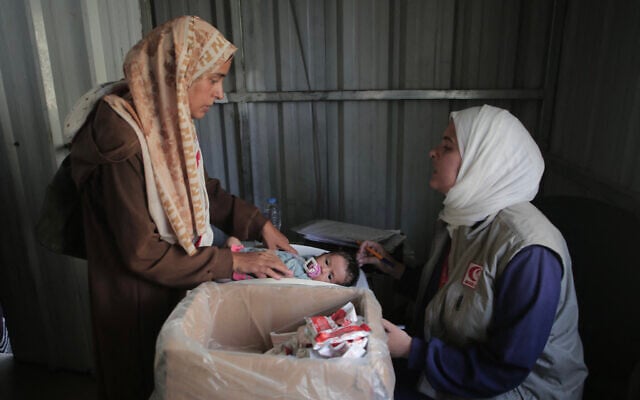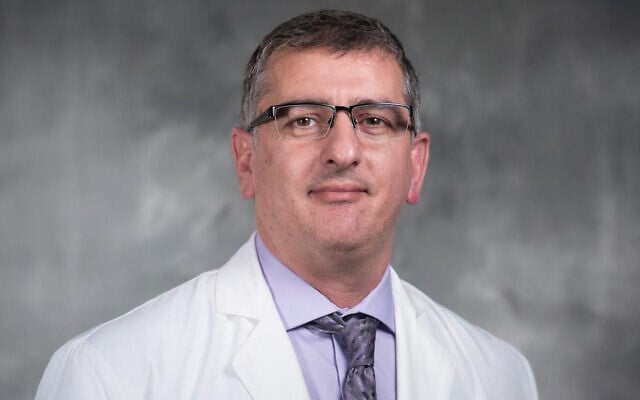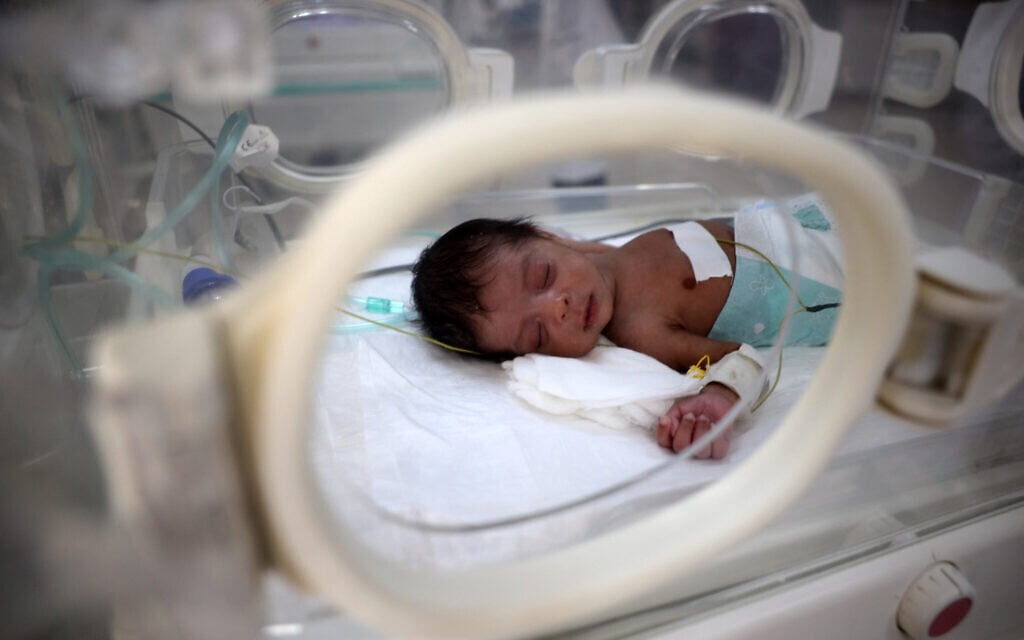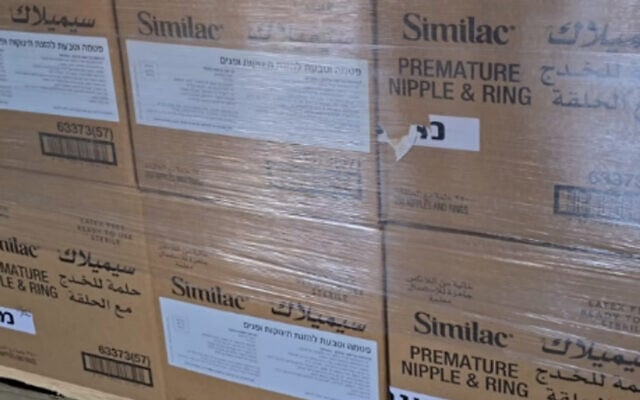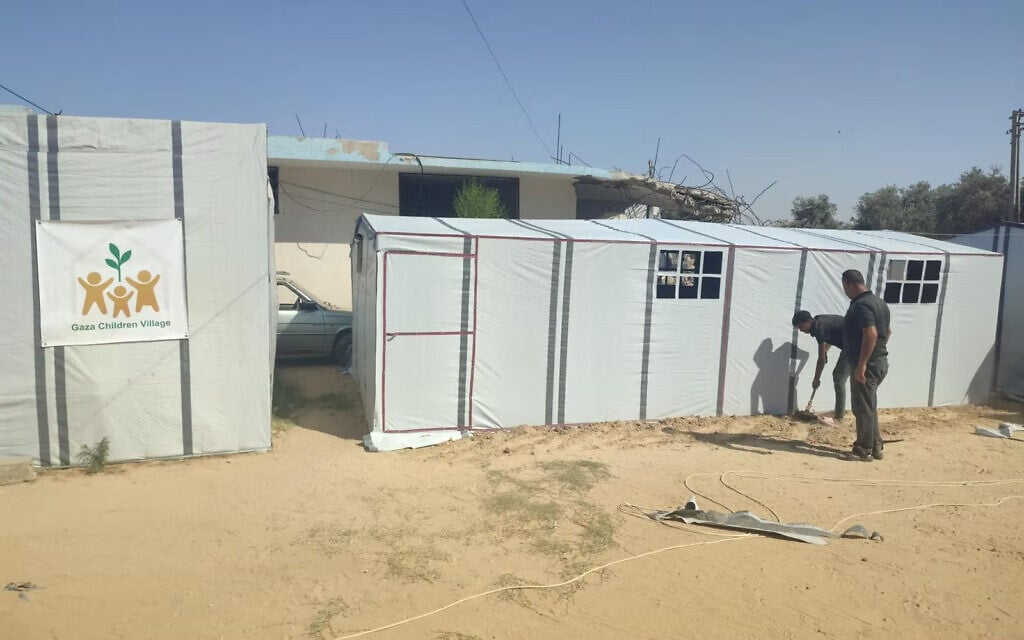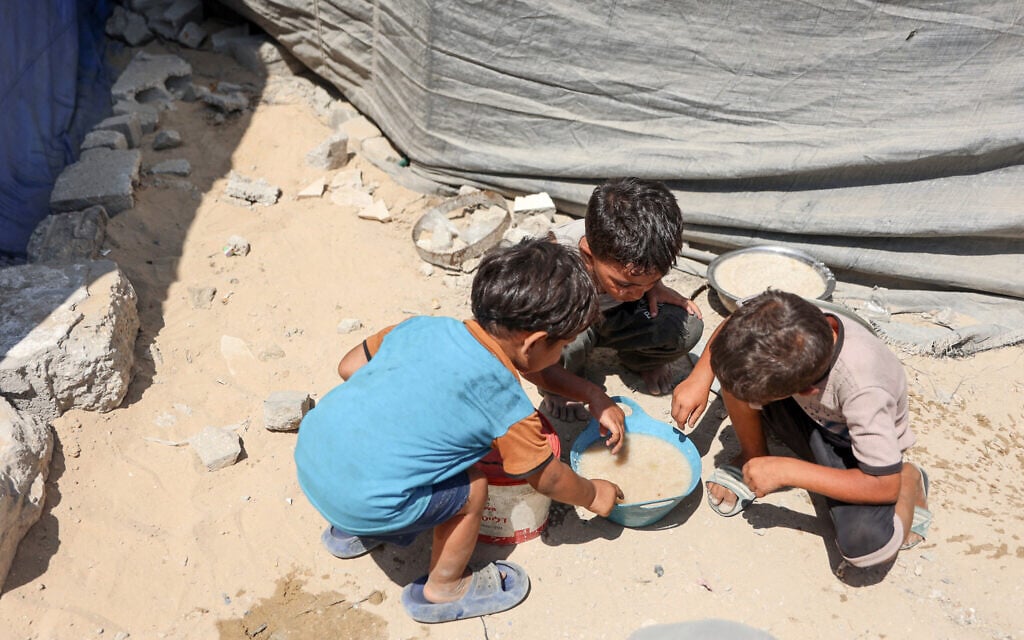


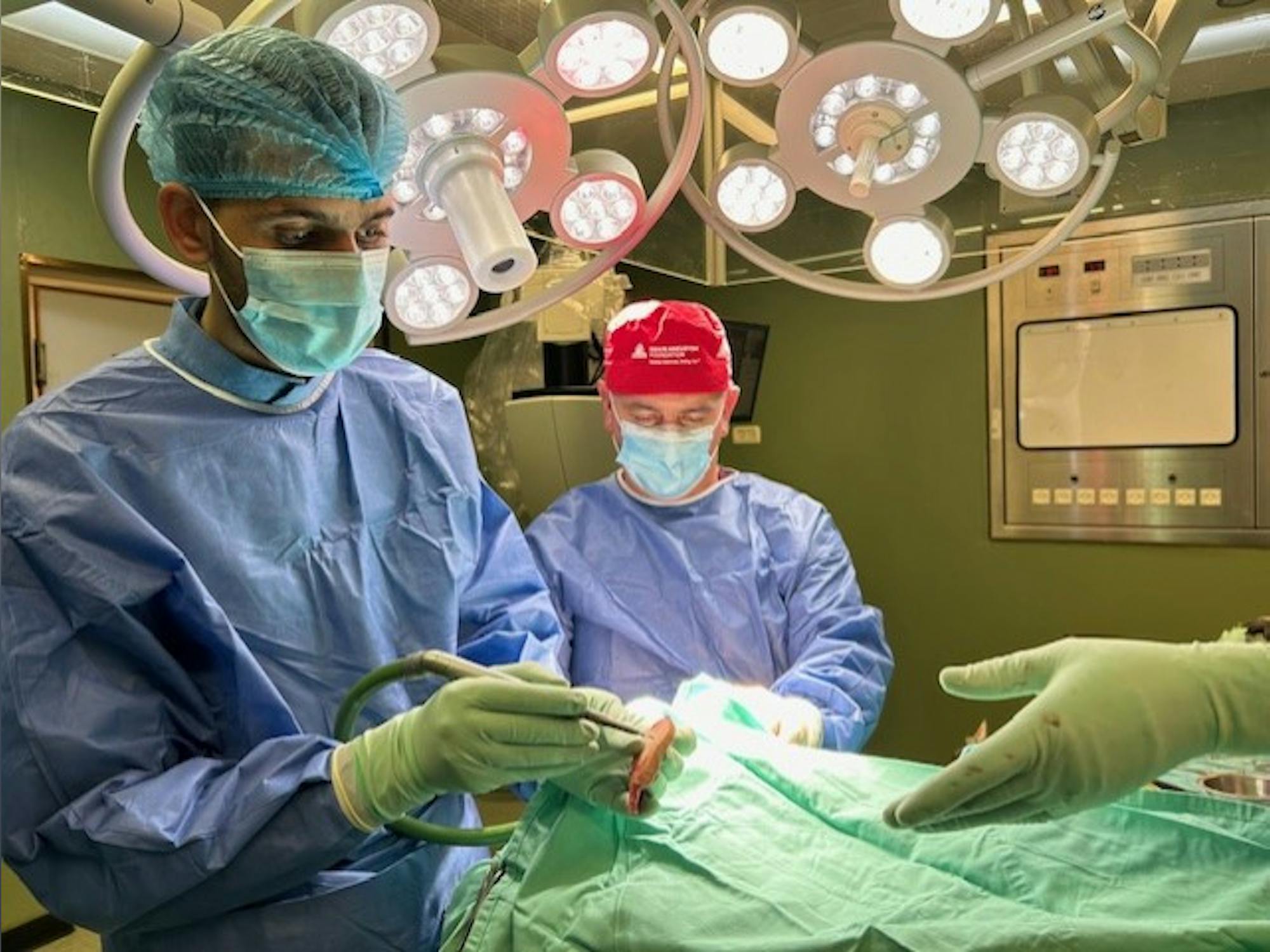
The first shipment of formula bottles for feeding preterm-born babies, infants, and young malnourished children is set to enter the Gaza Strip shortly, possibly as soon as Monday. It will also include meal-replacement shakes and nutritional drinks for women before or after childbirth.
This shipment cost $10,000, raised by “The Gaza Children’s Village,” an American nonprofit organization, headed by Dr. David Hasan, a senior neurosurgeon from Duke University in North Carolina. Beyond his medical career, Hasan has emerged as a driving force behind humanitarian efforts in Gaza, working to bring urgent relief to its most vulnerable residents.
“We have two projects,” Dr. Hasan explained in a Zoom interview with The Times of Israel, conducted last week from his home. “The first, and biggest, is the orphan village, where we are trying to reach approximately 20,000 children, based on the data we have. Our focus has always been, and continues to be, the most vulnerable children – orphans, unaccompanied kids, or injured children who cannot get proper medical treatment. It’s very challenging, but we’re doing our best.”
Hasan added that another central priority of the initiative is addressing the nutritional needs of premature babies, infants, and children. “For one reason or another, the population in Gaza is experiencing very limited supplies of meals. I don’t want to go into politics, but the end result is clear: there are many innocent people in Gaza who want peace with their neighbors and who do not support Hamas. I know this for a fact, because I heard it firsthand during my visits there.”
Hasan’s organization works with Israeli partners inside Israel, who are handling the product purchase and logistics. The formulas and nutritional solutions will first be delivered to World Health Organization warehouses, then distributed to Shifa, Al-Aqsa and two other hospitals that expressed interest, as well as to Deir al-Balah, where a new clinic and orphanage were established about three weeks ago.
An earlier attempt was made a few days ago to bring in the shipment, but approval had not yet been granted by Israel’s Coordinator of Government Activities in the Territories (COGAT). Hasan said he hopes the approval will come through this week. But he emphasized that it is not enough to just deliver nutritional solutions.
“If I find a kid who’s malnourished and I start giving him food, there is a syndrome called refeeding syndrome. And refeeding syndrome is as fatal as starvation itself,” he explained. “We don’t want to go in, deliver a meal, pat ourselves on the shoulder, and then two or three days later the kid is struggling because of refeeding syndrome and dies.”
According to the latest update from the UN Office for the Coordination of Humanitarian Affairs, the Gaza Strip has around 13,000 malnourished children, including 2,800 suffering from severe malnutrition. Even those who survive will suffer long-term damage. To help children and mothers survive the refeeding process, Hasan hopes to later introduce vitamins such as thiamine (B1), multivitamins, zinc, and other supplements.
Hasan said the next stage includes purchasing a peanut–based spread called Plumpy’Nut, which delivers a high number of calories relative to its package size. “It’s used in Africa, in Haiti, and in other starving countries. A small package is enough to supply a severely malnourished child with balanced nutrients and calories. We are now also moving on so as to address the older kids – not just 2 and younger, because they need the baby formulas, but also children 2 and older, maybe up to 5 or even 10,” Hasan added.
The initiative operates under the auspices of the European Pediatric Association, and includes Israeli experts such as Professor Dan Turner, head of pediatric gastroenterology at Shaare Zedek Hospital, and Dr. Dorit Nitzan from Ben Gurion University, who wrote the refeeding protocol. The group is in contact with doctors and medical staff inside Gaza, who report on needs and shortages.
So far, $150,000 has been raised from online donations, and Hasan hopes to reach a $1 million target. He is appealing to Jewish federations in North America and elsewhere. A quarter of the donors are Israelis – though many of them have faced obstacles.
One Israeli public body that wanted to donate a large sum was required to provide a letter from COGAT confirming the project, he said, in order to allay the bank’s concerns and allow the transfer.
Hasan explained the logic behind focusing on distributing formula, supplements, nutritional drinks or therapeutic spreads: “Innocent people are starving, and the most vulnerable in this population are the preemies (prematurely born babies), the infants, and children less than 2 or 3 years old.”
The most vulnerable in this population are the prematurely born babies, the infants, and children less than 2 or 3 years old
“Mothers who are pregnant are not getting enough nutrition or prenatal care. And with the constant instability, displacement, the war itself, and the trauma, most women do not make it to delivery rooms. And if they do, there aren’t enough anesthetics for cesarean sections, and sometimes not even for vaginal births,” Hasan continued.
“There is a health crisis. When babies are born, mothers who are already malnourished cannot breastfeed. The children get the double whammy, because since March, the hospitals have not had enough formula for babies, premature infants, and toddlers. They are not getting adequate nutrition. Some of them are surviving only on saline water and barely survive. Our goal is to reach them inside the hospitals and save them,” he said.
“Hopefully, once we establish the logistics of purchasing the formula from pharmaceutical companies in Israel, we can acquire much larger quantities. We are working together with kindhearted Israelis and Jews, as well as Palestinians. And we will ship these with the help of the WHO and with the blessing of COGAT into Gaza,” Hasan added.
Hasan himself has entered Gaza twice to perform surgeries and visits Israel frequently – he said he last visited last month – so he speaks about conditions in the Strip from experience. “There are a lot of obstacles, one of them is looting and the safety of the shipments,” he explained. “Once you pass Kerem Shalom crossing (into Gaza Strip), it’s complete anarchy. And I saw this when I was there in April.”
There are a lot of obstacles, one of them is looting and the safety of the shipments. Once you pass Kerem Shalom, it’s complete anarchy
“Once we provide the hospitals’ needs, then we will work with the bigger share of the population,” he continued. “The need is immense. The borders are open, trucks are coming in, but the distribution is unequal. Some have easy access, others are isolated in pockets, like islands in an ocean. And these are the people we are trying our best to reach.”
Alongside the purchase of nutritional products, another project earmarked for donations is an orphanage that opened its doors at the end of last month in Deir al-Balah. It currently houses several hundred children, who receive food, education, and psychological care.
The original plan, said Hasan, was to set the orphanage up near the Erez Crossing in the north of the Strip and operate under the shield of IDF’s protection, but ultimately the decision was made to establish it in the center of the Strip.
“If we were close to Erez, this would have allowed us to bring the products through the crossing which is like one or two miles away. But after the ceasefire [between January and March], the IDF withdrew to the border and Hamas moved in. And we didn’t want to work with them,” Hasan said. “We had a piece of land there. We had the approval of COGAT. Everything was ready to go. Then in March, the ceasefire collapsed and the IDF expanded its operation. So we decided on Deir al-Balah, which is a safer area for the displaced people.”
“We spoke with many parties. All of them said it would be impossible, it’s not going to happen. But we worked tirelessly and consistently. And with local help we succeeded in establishing the first village, which we call the Academy of Hope. We were able to purchase the materials and build the Academy for 500 orphans at this stage, and we will work on improving the structures going forward,” he explained.
“The kids come in the morning, and they go back to foster families in the afternoon. Some of them, when they came, they had not eaten for three days. So, immediately we contacted the World Central Kitchen. And we opened on July 26, and on the 27th, they were providing meals. The kids go back to their families with a piece of bread so they can survive the night. We are the first and only educational institution in all of Gaza and the West Bank that is operating an Israel-friendly curriculum,” Hasan said proudly.
“That’s why I say this is an impossible mission. Landing on Mars might be easier. There are kids in wheelchairs who show up even before the school opens in the morning, just to play. Some of them have external fixators for fractures, injuries. They just come to play. And in addition to education and meals, they also receive psychological care. And they have a chance to be in a safe place, play together, and forget the war and its images,” he said.
There are kids in wheelchairs who show up even before the school opens in the morning, just to play. Some of them have external fixators for fractures, injuries
“About 20 meters (65 feet) from the academy, there is a two-story building. There is a doctor and eight nurses who work there. Their mission is to care for the orphans and to be there for the community. We are working with large organizations to provide them with medications and equipment for the clinic,” Hasan said.
“The needs are immense,” he continued. “As soon as we started, we had dozens of kids and adults who need dialysis and cancer treatment. And behind the school, we built a kitchen with 12 big pots so we can cook for them.”
Hasan, 50, was born in Kuwait to a family that had emigrated from the West Bank, and he began studying medicine in the US at the age of 18. Today, he is a senior surgeon and researcher at Duke University. In an interview with Haaretz last year, he described his difficult experiences in his two visits to Gaza.
Now Hasan is driving the effort to respond to malnutrition and rehabilitate children, with the goal of expanding that response as widely as possible. Humanitarian aid is far from his professional field, but he is determined to succeed.
“Ask me anything about neurosurgery and I’ll tell you. But in this field, I had zero experience. And when you care, it becomes David against the Goliath of hatred, antisemitism, Islamophobia. That’s what sets us apart. Good people who want the best for everyone,” he told The Times of Israel in the Zoom interview from his North Carolina home.
Our goal is to create a culture of hope, love, peace, tolerance and understanding of the other side
“We are outrageously ambitious. We will try to expand the academy and reach to mothers and fathers too, to provide them with training. We will use the Israel-friendly curriculum to reach them too. Our goal is not just today and tomorrow, but five years, 10 years down the road – to create a culture of hope, love, peace, tolerance, and understanding of the other side,” he continued.
Hasan sets his goals high and wide: “We are in a pilot phase. Right now, the project, which is geared for 500 children, is working. The next stage will be 5,000 and maybe we become a network of schools. The environment is fluid, dynamic. We don’t know what the next stage will be.”
“The Israeli cabinet has declared they are going to advance into Gaza City. I immediately expressed concern to one of the government officials, that if the children get displaced, we are not going to find them again. We gave them the coordinates, the pictures of the village, and they promised they will protect it,” he said.
We are in a pilot phase. Right now, the project, which is geared for 500 children, is working. The next stage will be 5,000
“We received a good response from the Israeli government, which is helping, listening. Things can change to better or worse. If there is a tailwind, we will expand quickly. If not, we are going to try to preserve what exists until things get better,” he continued.
“The project is designed to give hope, and we want to be a model for the day after. The war has polarized everyone, has pushed everyone to one side or the other. There is no people in the middle anymore, and that is a problem,” Hasan said.
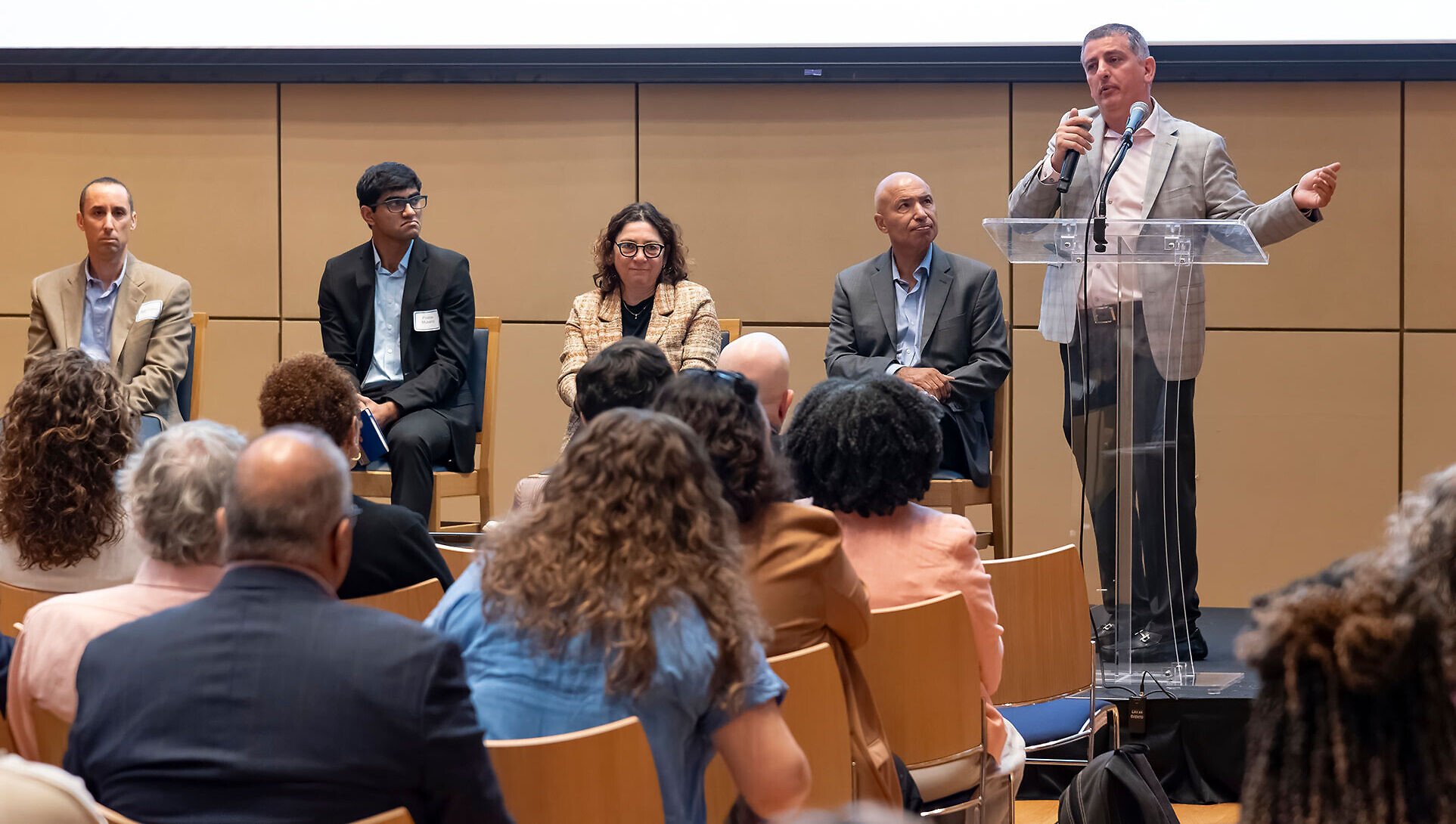
“For meaningful peace, you need hope, you need communication between the people. Governments is another matter. But the project here, where Israelis, Jews, Arabs, Palestinians from all over the world working shoulder to shoulder for one common goal – it makes it possible to build relationships instead of hatred and anger and revenge, and to see there are human beings on the other side and appreciate them more,” he explained.
And Hasan concluded: “This is my hope. This is my message that resonates worldwide. That there is a seed of hope, everybody wants to nurture, to make it a tree and give the fruit. And it should not be sacrificed.”
Translated from the original Hebrew article on the Times of Israel’s sister site, Zman Yisrael.

